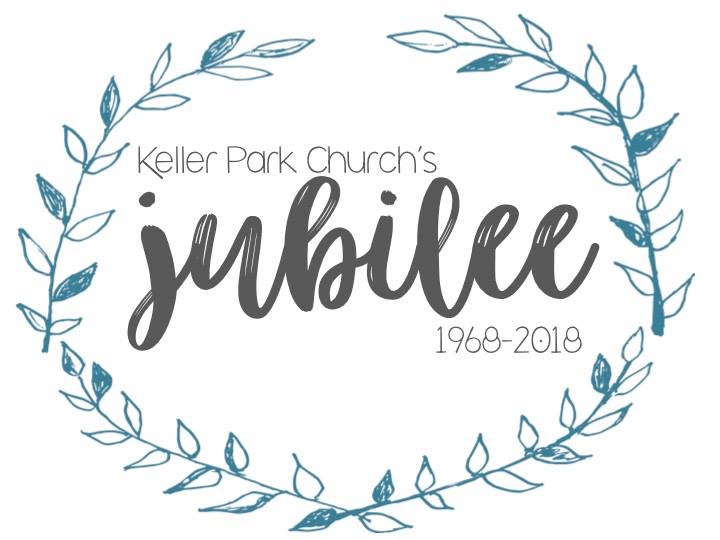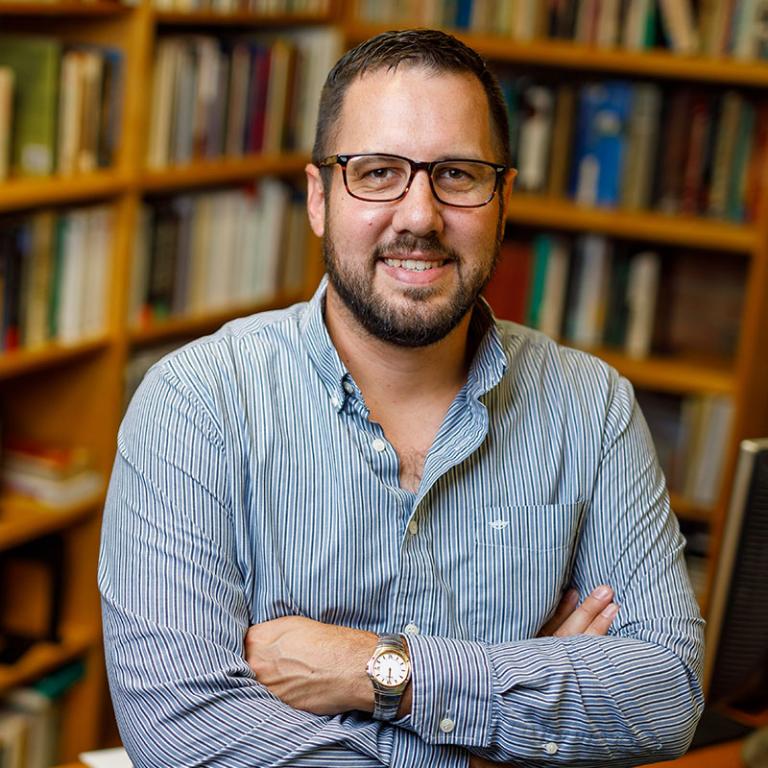Last year the church where I serve as teaching pastor, Keller Park Church (South Bend, Indiana), celebrated its 50th anniversary—or our very own year of Jubilee. To celebrate this occasion, I preached a series on the Jubilee theme as found in the Gospel of Luke (with allusions to Isaiah and Leviticus). Below is the fifth sermon of the series. (While you’re here, check out the other sermons, Revolution, Release, Rest-oration, and Remembrance.)

If you ever read straight through one of the Gospels, you’ll be struck by the sheer volume of healing stories. One author estimates that 20% of the Gospels is devoted to Jesus’s healings and the discussions that ensue. Another author counts 18 healing stories in Mark, 19 in Matthew, and 20 in Luke. The Gospel of John adds another four healing stories, which are described there as “miraculous signs.”
But if these healings are to be understood as “signs,” it seems fair to ask, What do these signs signify? Typically one of two options is offered for what these signs point to. They either point to Jesus or they point to faith.
There is something to be said for each of these answers. As our kids at KPC know, you can rarely go wrong when you answer “Jesus” to a question in Sunday school. And in the Gospel of John especially, Jesus’s miraculous signs seem designed to demonstrate that Jesus is the Word who took on human flesh.
But if we stop there, our temptation is to make the healing stories into little more than apologetic evidence that Jesus is the Son of God. In so doing, we let ourselves off the hook. Of course Jesus went around healing the blind, the deaf, and the crippled, we reason. He was the Son of God. He had power and authority that we don’t possess.
But if that’s all they’re designed to indicate, then it seems like overkill to devote a fifth of the Gospel narratives to healing accounts. It would seem that Jesus’s resurrection itself would be all we need to make that point.
Moreover, before Jesus’s public ministry, he resists the devil’s temptations to perform miracles just to prove that he is the Son of God. The devil had told him, “If you are the Son of God, tell this stone to become bread” (Luke 4:3). And, “If you are the Son of God, throw yourself down” from the high point of the temple (Luke 4:9).
It would be strange of Jesus to resist the devil’s temptations to prove he is the Son of God, only to immediately go out trying to prove this to everyone else. In fact, often Jesus does just the opposite. After healing a man with leprosy, Jesus tells the man, “Don’t tell anyone” (Luke 5:14). Throughout much of the Gospel narratives, Jesus seems to want to keep his identity a secret rather than trying to prove it. So there must be something more going on with these healing stories.
Which leads to the second alternative. Maybe the point is not to highlight Jesus’s divinity but to highlight the need for faith. After all, Jesus tells the blind man in our narrative, “Your faith has healed you” (Luke 18:42). Elsewhere he commends the faith of a man’s friends who bring the man to Jesus for healing (Luke 5:20). And he commends the “great faith” of a Roman centurion who asks Jesus to heal his servant (Luke 7:9). So there seems to be some truth to this view as well.
But the problem about making these healing stories about the faith of the one healed—or the faith of his or her friends or relatives—is that it can easily become falsely universalized or moralized. We are tempted to reason that, if the faith of the blind man healed him, then my faith should heal me to. And so we turn faith itself into a magical healing power. If you want to be healed, you just need to have faith!
But when we universalize it—when we make it a promise for everyone—then it quickly becomes moralized. If you aren’t healed, that indicates that you must not have enough faith.
I had some friends who struggled for years with infertility. The husband told me a story about a man at church who approached him once and said, “I’ve been praying that you’ll be able to have a baby.” Before my friend had a chance to thank him, the man added, “I have faith that it will happen, so there must be something wrong with you!”
Though the man later apologized, the message he expressed is a common one. Not only do the sick and disabled have a physical defect; they also have a spiritual one. If only their faith were stronger, they would be made well like the rest of us (whose physical health suggests spiritual health as well).
By making Jesus’s healing stories all about faith, then, we ironically turn faith into a work. And so these stories that are meant to proclaim good news end up being read as bad news for those who haven’t been healed. So reading these stories as primarily about faith doesn’t seem quite right either.
But if these healing stories aren’t intended primarily as proofs of Jesus’s divinity or as lessons on the need for faith, what are they about? To answer that question, it is important to read them in the context of the Gospel in which they appear.
The context of this story, the healing of the blind beggar, is the Gospel of Luke. As we’ve seen over the course of our Jubilee sermon series, Jesus’s public ministry in Luke kicks off with his reading of the scroll of Isaiah in his hometown synagogue.
We read in Luke 4:17–19 that Jesus unrolled the scroll he was given and “found the place where it is written:
‘The Spirit of the Lord is on me, because he has anoint me to preach good news to the poor. He has sent me to proclaim freedom for the prisoners and recovery of sight for the blind, to release the oppressed, to proclaim the year of the Lord’s favor.’”
Notice what Jesus is sent to preach and proclaim. He preaches good news to the poor. He proclaims freedom for prisoners, recovery of sight for the blind, and release for the oppressed. He proclaims the year of the Lord’s favor.
Jesus wasn’t just randomly reading whatever passage he came across in the scroll handed to him. Luke says that Jesus “found” the passage and read it. Jesus intentionally preached and proclaimed these things at the inauguration of his public ministry.
He wanted everyone to know that these things are what his ministry is about. And then he goes out and enacts that which he proclaims. His healings are not mere window dressing used to reinforce his actual message. They are part of the proclamation itself. The sign and that which is signified are inseparable.
Check out this remarkable passage three chapters later. In Luke chapter 7, beginning in verse 18, we are told that John the Baptist’s disciples report to John about Jesus’s healings. And so John sends two of them to ask Jesus, “Are you the one who was to come, or should we expect someone else?”
Look at how Jesus responds to this question starting in verse 21:
“At that very time Jesus cured many who had diseases, sicknesses and evil spirits, and gave sight to many who were blind. So he replied to the messengers, ‘Go back and report to John what you have seen and heard: The blind receive sight, the lame walk, those who have leprosy are cured, the deaf hear, the dead are raised, and the good news is preached to the poor. Blessed is the man who does not fall away on account of me.’”
This last line literally reads, “Blessed is the one who is not scandalized on account of me.”
Notice that Jesus never directly answers John’s query. He doesn’t give him a yes or no to whether he is the one. Instead, in response to the question asked by John’s messengers, Jesus starts healing people. And then he tells them to report to John what they’ve witnessed.
In Jesus’s healings, exorcisms, and preaching of good news to the poor, the year of the Lord’s favor—the Jubilee—has arrived! Don’t be scandalized!
We might wonder, Why would anyone be scandalized by a man who heals? The definition of “scandalize” is “to shock or horrify someone by a real or imagined violation of propriety or morality.”
Many of the religious people of Jesus’s day held precisely the view that we discussed earlier. They believed that those who are blind, crippled, leprous, deaf, or poor were that way precisely because of their lack of faith—or because they were “sinners.”
By healing such people instead of condemning them, Jesus is violating his religious society’s sense of propriety and morality. He says, Look at how great the faith of this blind beggar is—he trusts God even in the absence of physical healing! When all the rest of you told him to shut up and get out of the way, he cried out all the more, “Son of David, have mercy on me!”
Today we might be scandalized for other reasons as well.
Some of us might be scandalized that Jesus physically heals some people and not others. When we hear a miraculous healing story, it violates our sense of justice. Instead of rejoicing with those who have been healed, we resent them.
Others of us are scandalized by the idea of miraculous healing in general. We’ve seen so many phony faith healers on TV that we’re incredulous at any and all testimonies of miraculous healings. Perhaps in a pre-scientific age, miraculous healings could be believed, but today we know better. Or perhaps Jesus really did heal some people while he walked here on earth, but now that he’s gone, such healings have ceased.
Still others of us are scandalized by Jesus’s equation of the good news, the gospel, with physical recovery. The gospel, we’re told, is about our spiritual recovery. It’s about the forgiveness of our sins so that we can be reconciled to God. It is about our souls, not our bodies. But Jesus refuses to separate the two.
He doesn’t meet people’s physical needs so that he can then address their spiritual ones. Physical and spiritual recovery alike are essential to the good news he proclaims.
Perhaps the reasons we separate the two is that it lets us off the hook. God is the one who forgives people’s sins. At most, we just have to tell people that their sins are forgiven.
But if physical recovery is part of the good news as well, then, like Jesus, our proclamation of the good news might involve not only our words but our hands.
So what might it look like to proclaim recovery in our context? Minimally, it means regularly praying for those who have health conditions or physical impairments.
But we can’t stop there. Proclaiming recovery means, second, being present with those who are suffering. It means being there when healing doesn’t come. As Paul writes to the Corinthians (1 Cor. 12:26), when one part of the body suffers, the whole body suffers.
This means, third, that we need to bear one another’s burdens, as Paul writes to the Galatians (6:2).
Proclaiming recovery means, fourth, recognizing and appreciating those in our midst with the gift of healing. Again, Paul writes to the Corinthians that the Spirit has given some of us the gift of healing. This might include miraculous healing, but it is not limited to it. We can acknowledge the work of nurses, therapists, doctors, and social workers as part of the church’s proclamation of the gospel. Their work is not secular as opposed to the spiritual work of pastors. It brings good news to those who are suffering.
Fifth, proclaiming recovery means supporting those initiative in society that provide means of recovery beyond what the church is able to provide. We must recognize that the kingdom of God is bigger than the church. While the church has a special mandate to proclaim the gospel, the implications of Jubilee extend beyond the church. There are some means of recovery that the church is simply unable to provide. Instead of arguing that it’s exclusively the church’s job to meet people’s needs, we can support those aspects of society that God uses to bring physical recovery. Even if every church member in America tithed 10% of their salary and that entire amount was used exclusively to care for people’s physical needs, there would still be many whose needs would go unmet.
Finally, and somewhat paradoxically, proclaiming recovery means accepting the decay and death of our bodies. It means proclaiming that, in Christ, death has lost its victory, and the grave has lost its sting. We need not cling desperately to the survival of our bodies, but, as Paul writes to the Romans, we offer our bodies as living sacrifices, holy and pleasing to God.
This may mean that we forego extravagant medical treatments designed to prolong life. We lay down our own lives—our need to stay alive at all costs—so that those who need the basic health care can receive it. For we know that, as Christians, death is not the final word; resurrection is.













